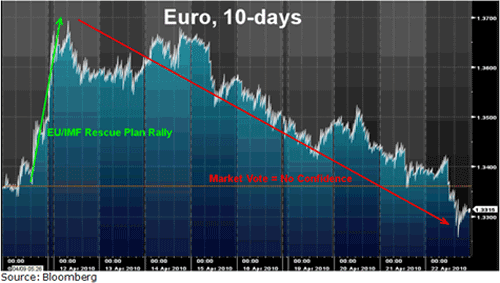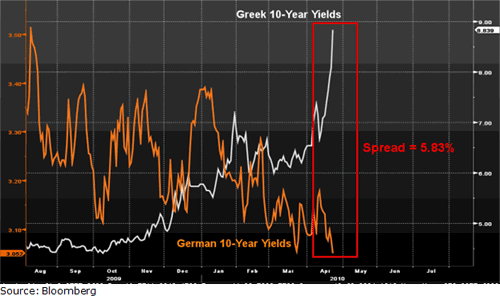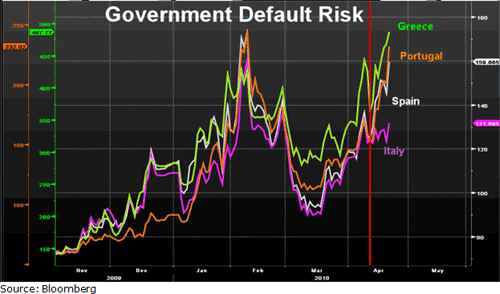Watch the Euro for Important Clues on Global Financial Markets
Currencies / Fiat Currency Apr 24, 2010 - 02:48 PM GMTBy: Bryan_Rich
 If you’re looking for clues on where stocks, commodities and global economies are headed, you might be better served keeping a close eye on the euro, rather than on the incoming stream of corporate earnings reports.
If you’re looking for clues on where stocks, commodities and global economies are headed, you might be better served keeping a close eye on the euro, rather than on the incoming stream of corporate earnings reports.
That’s because the ongoing crisis in the euro zone, and the respective threat that Greece and the other weak spots in Europe are posing to the lifespan of the euro, has very significant implications for global markets.
I touched on this topic last week in my column, “How Greece Can Impact YOU!“
I also said in that piece that, despite all of the crisis management tactics used by euro-zone officials, the situation in Greece was far from over.
And this past week, we’ve seen clear evidence of that.
Since the implications of this sovereign debt crisis have a broad reach, let’s take a closer look at how things are playing out in Europe.
Investors Voting with Their Feet
Two weeks ago many market participants happily accepted a proposed euro-zone/IMF rescue plan for Greece — one with aggressive numbers behind it — as a resolution to the euro’s problems. And those same participants likely viewed the euro as a bargain, snapping up the euro at $1.35 … 11 percent lower than the post-crisis highs of just five months ago.
As such, the result was a sharp rally in the euro.
But it was short-lived.
In fact, the knee-jerk recovery in entire “euro crisis trade,” has since fully reversed … and then some.
Take a look at these three charts …
In the chart below, you can see how the initial jump in the euro was quickly reversed. And since then, the euro has traded to new 2010 lows.

This next chart compares German and Greek borrowing costs. As members of Europe’s Economic and Monetary Union, these two countries share a common currency and common monetary policy. So in theory, the cost of government borrowing should be the same.

But as you can certainly see, speculators and investors have been bailing on Greek bonds, driving up the spread between Greek yields (the white line) and German yields (the orange line) to 12-year highs. Thus making the Greek government’s ability to refinance debt nearly impossible!
Now that all of the cards are on the table, and the market vote has been one of “no confidence,” the attack is being levied on the other weak spots — especially Portugal.
This next chart of the sovereign debt credit default swap market measures the market’s appetite for insurance against a government default.

It’s certainly obvious the price of this insurance is being driven dramatically higher for those countries that represent the next likely dominos in line for Europe’s sovereign debt crisis.
These market reactions are clearly negative for the euro and negative for global economic stability, showing that …
Europe’s Sovereign Debt Crisis Is Fully Involved
Countries that have joined the euro currency have unique challenges when economic times are tough.
That’s because the monetary union in Europe consists of a common currency and a common monetary policy. But fiscal policy is determined by each individual country. And to patrol those fiscal decisions, the European Union established its Growth and Stability Pact that, among other things, sets two criteria for member countries:
1) Deficit spending cannot exceed three percent of GDP, and
2) Total government debt cannot exceed 60 percent of GDP.
As we well know, after a battle with global recession, those limits have been completely blown out of the water by many members of the euro monetary union.
So these problems aren’t new, they’re just coming to a head! And they aren’t going away anytime soon.
I’ve written several Money and Markets columns about the fallout in Europe and the growing risks of a contagion of sovereign debt fears. In fact, my first column this year was titled “Will the Euro Become the World’s Most Hated Currency for 2010?“
And in recent months I’ve laid out even more of the story, including …
- The structural flaws of the European monetary union and the threats those flaws represent to the lifespan of the euro,
- The inability of the Emu to enforce fiscal constraints on euro members,
- The irreparable damage to the credibility of the euro as a contending primary world reserve currency,
- The vulnerability of a sovereign debt contagion within the euro zone and beyond,
- And the teetering dominos that stand behind Greece as the next likely candidates … among which are the major advanced economies of the world.
And despite the many hailed resolutions that have been proclaimed in recent months to the problems in the Greek drama, I’ve explained why the potential outcomes facing the euro are “no-win.”
Here are two of the distinct possibilities I foresee:
Scenario 1— More handouts
A euro-zone bailout of a fellow member would be a breach of the guiding principles upon which the euro was built. It would create an irreparable moral hazard, remove incentives for fiscal responsibility and open the floodgates of other weak euro-zone countries to come looking for a bailout of their own.
Scenario 2— Euro collapses
On the other hand, a default in Greece would make a breakup of the euro highly probable. It would set off a calamity of sovereign debt fears and threaten the European banking system.
Both scenarios jeopardize the landscape of global economic stability and the 11-year old, single currency concept.
So keep a close eye on the euro and on the ongoing developments in Europe. They could provide important clues on what to expect from financial markets and the global economy going forward.
Regards,
Bryan
This investment news is brought to you by Money and Markets. Money and Markets is a free daily investment newsletter from Martin D. Weiss and Weiss Research analysts offering the latest investing news and financial insights for the stock market, including tips and advice on investing in gold, energy and oil. Dr. Weiss is a leader in the fields of investing, interest rates, financial safety and economic forecasting. To view archives or subscribe, visit http://www.moneyandmarkets.com.
© 2005-2022 http://www.MarketOracle.co.uk - The Market Oracle is a FREE Daily Financial Markets Analysis & Forecasting online publication.



